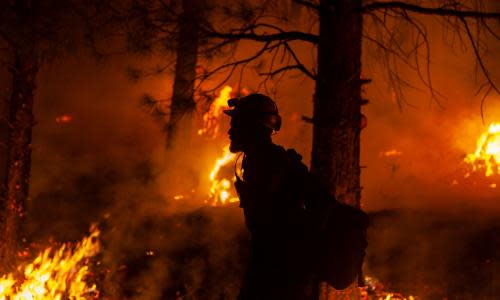The Observer view on the urgency of tackling climate change

Reminders that our planet is wilting under the impact of human-driven climate change have been hard to avoid this month. Catastrophic floods have killed 160 in Germany while more than 50 died after massive inundations swept through the central Chinese province of Henan when a year’s worth of rain fell in three days last week. At the same time, forest fires have ripped through one of the world’s coldest places, Siberia, after unusually hot, dry weather gripped the region. Canada and the US have also been afflicted by conflagrations that have destroyed communities and vast areas of woodland. One blaze in the US state of Oregon has spread over an area 25 times the size of Manhattan and has raged out of control for weeks. Global warming, triggered by rising levels of greenhouse gases, has been implicated in every case.
Nor will things get better. Indeed, they can only get worse. Every year, factories, power plants and vehicles pump tens of billions of tonnes of carbon dioxide into our atmosphere, trapping solar radiation that will further increase temperatures round the globe. Even if all greenhouse gas emissions were halted tomorrow the carbon dioxide already in our atmosphere will hang around for decades and continue to heat the planet, turning vegetation to tinder and allowing air to retain more moisture before releasing it with sudden and devastating consequences.
Not that there is any prospect of humanity quitting its fossil fuel addiction overnight. At best, we might reach such a goal by 2050, the date set by world leaders for achieving net-zero emissions of greenhouse gases. In other words, we are going to experience increasingly severe, devastating weather events for a further 30 years. Floods, wildfires and storms, along with shrinking icecaps, rising sea levels, bleached coral reefs and spreading deserts, will become the norm. And that is the best we can hope for over the next three decades.
The problem, say scientists, is that to halt worsening weather patterns by 2050, rises in global temperatures will have to be limited to around 1.5C from pre-industrial days. However, the world has already heated up by 1.2C since then, thanks to the greenhouse gases we have put into the atmosphere, and the prospects of limiting further rises to a fraction of a degree over the next 30 years look remote. In fact, estimates based on current pledges by nations to cut emissions suggest temperatures are likely to rise by more than 2C above preindustrial levels by the middle of the century.
In such a future, more than a quarter of the world’s population would be likely to experience extreme drought for at least one month a year; rainforests would face eradication; melting ice sheets would result in dangerous sea level rises and trigger major changes in the behaviour of ocean currents such as the Gulf Stream. In addition, loss of reflective ice from the poles would cause oceans to absorb more solar radiation, while melting permafrost in Siberia and other regions would release plumes of methane, another greenhouse gas. Inevitably, temperatures would soar even further.
This terrifying prospect has come about because politicians and business leaders have failed, for several decades, to appreciate the risks involved in massively interfering with the make-up of our atmosphere and to instigate measures to limit the damage. As a result, the world faces a climate catastrophe with little time left to act to counter the threat. We now have fewer than 100 days before the United Nations’s Cop26 climate change conference opens in Glasgow, when world leaders will be given one last, clear chance to limit climatic mayhem.
The prospects do not look encouraging as was made abundantly clear on Friday in Naples, when energy and environment ministers from the G20 group of rich nations, together responsible for 85% of annual emissions, could not agree on a full package of commitments to tackle climate change. The G20 meeting was viewed as a critically important staging post leading up to Cop26 and its failure to find common ground shows how difficult it will be to secure a meaningful accord in Scotland. A major point of contention last week was the refusal of India and China to agree to the early phasing out of coal power, one of the most environmentally damaging industrial processes on the planet.
Even more worrying is the fact that rich countries and developing nations are at loggerheads about how to divvy up the bill that will have to be paid to tackle global warming. The latter were supposed to receive at least $100bn a year from public and private sources in rich nations in order to help them avoid the worst ravages of the extreme weather triggered by the oil, gas and coal burned by developed countries over the past two centuries on their route to industrial might. This was one of the cornerstones of the international climate negotiations ahead of the 2015 Paris agreement, which committed the world to trying to keep global warming below 1.5C. However, rich countries have failed to honour these commitments. Such disagreement bodes badly for Cop26 in November.
Politicians’ next chance will occur in October when heads of state and leaders of the G20 nations are scheduled to meet and, hopefully, ensure the final run-up to Cop26 is put back on track. If not, the prospects for the summit achieving success look worrying. Saving the world is going to go right to the wire, it transpires.

 Yahoo Finance
Yahoo Finance 